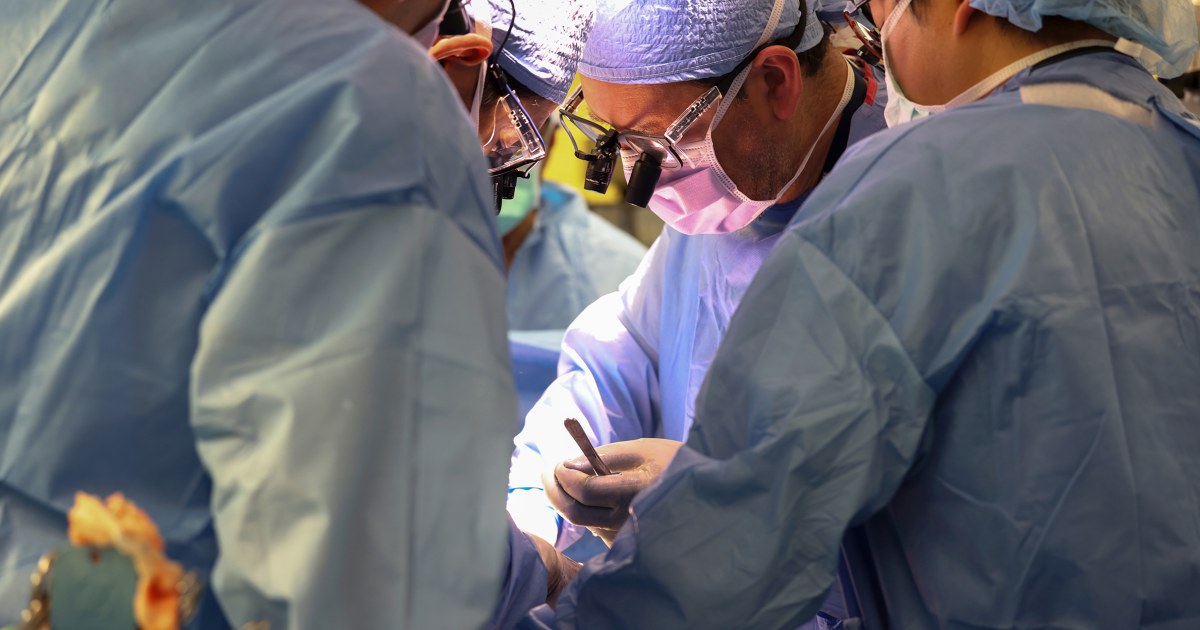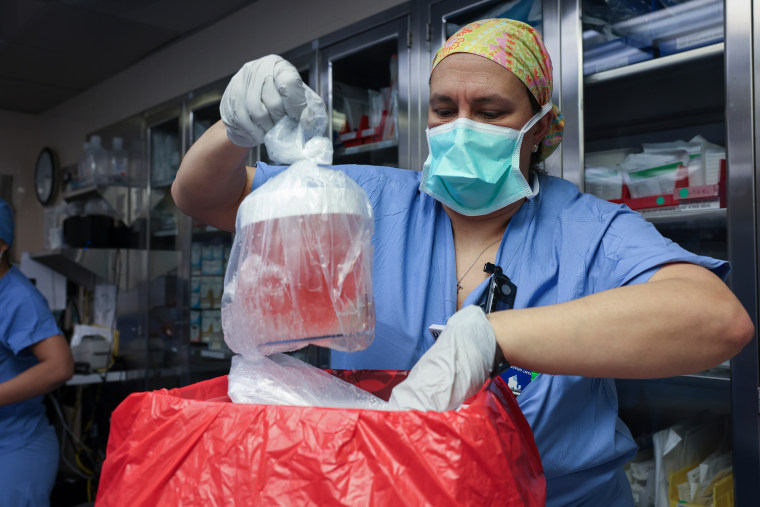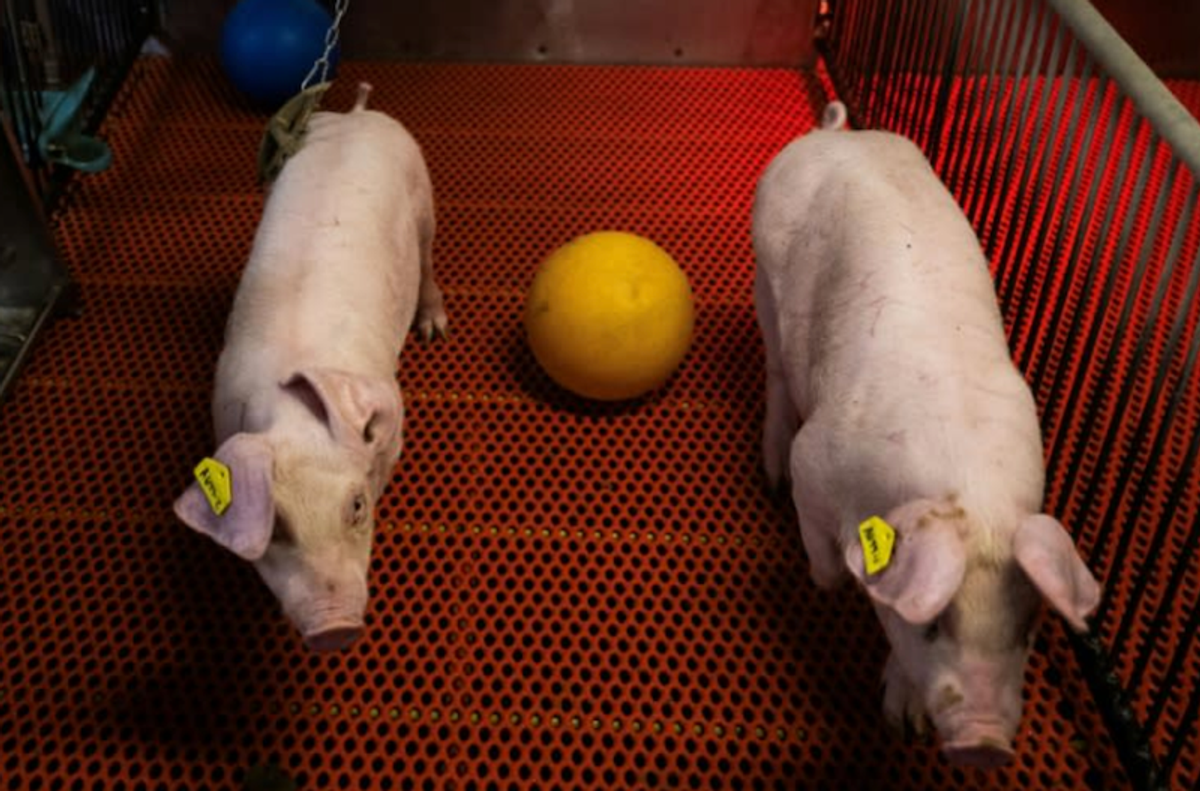
Surgeons Transplant Pig Kidney Into a Patient, a Medical Milestone
The man continues to improve, doctors said. Organs from genetically engineered pigs one day may make dialysis obsolete.
Surgeons Transplant Pig Kidney Into a Patient, a Medical Milestone
The man continues to improve, doctors said. Organs from genetically engineered pigs one day may make dialysis obsolete.
Surgeons performed the world’s first genetically modified pig kidney transplant into a living human at Massachusetts General Hospital on March 16.Credit...Michelle Rose/Massachusetts General Hospital, via Agence France-Presse — Getty Images
By Roni Caryn Rabin
March 21, 2024Updated 11:28 a.m. ET
Surgeons in Boston have transplanted a kidney from a genetically engineered pig into an ailing 62-year-old man, the first procedure of its kind. If successful, the breakthrough offers hope to hundreds of thousands of Americans whose kidneys have failed.
So far, the signs are promising.
Kidneys remove waste products and excess fluid from the blood. The new kidney began producing urine shortly after the surgery last weekend and the patient’s condition continues to improve, according to physicians at Massachusetts General Hospital, known as Mass General. He is already walking the halls of the hospital and may be discharged soon.
The patient is a Black man, and the procedure may have special significance for Black patients, who suffer high rates of end-stage kidney disease.
A new source of kidneys “could solve an intractable problem in the field — the inadequate access of minority patients to kidney transplants,” said Dr. Winfred Williams, associate chief of the nephrology division at Mass General and the patient’s primary kidney doctor.
If kidneys from genetically modified animals can be transplanted on a large scale, dialysis “will become obsolete,” said Dr. Leonardo V. Riella, medical director for kidney transplantation at Mass General. The hospital’s parent organization, Mass General Brigham, developed the transplant program.
Over 800,000 Americans have kidney failure and require dialysis, a procedure that filters toxins from the blood. Over 100,000 are on a waiting list to receive a transplanted kidney from a living or dead human donor.
In addition, tens of millions of Americans have chronic kidney disease, which can lead to organ failure.
While dialysis keeps people alive, the gold-standard treatment is an organ transplant. Thousands of patients die annually while waiting for a kidney, however, because there is an acute shortage of organs. Just 25,000 kidney transplants are performed each year.
Xenotransplantation — the implantation of an animal’s organ into a human — has for decades been proposed as a potential solution that could make kidneys much more widely available. But the human immune system rejects foreign tissue, causing life-threatening complications, and experts note that long-term rejection can occur even when donors are well matched.
In recent years, scientific advances including gene editing and cloning have edged xenotransplants closer to reality, making it possible to modify animal genes to make the organs more compatible and less likely to be rejected by the immune system.The kidney came from a pig engineered by the biotech company eGenesis, which removed three genes involved in potential rejection of the organ. In addition, seven human genes were inserted to enhance human compatibility. Pigs carry retroviruses that may infect humans, and the company also inactivated the pathogens.
In September 2021, surgeons at NYU Langone Health in New York attached a kidney from a genetically modified pig to a brain-dead man and watched as it began to function and make urine. Shortly afterward, scientists at the University of Alabama at Birmingham announced they had performed a similar procedure with similar results.
Surgeons at the University of Maryland have twice transplanted hearts from genetically modified pigs into patients with heart disease. While the organs functioned and the first did not appear to be rejected, both of the patients, who had advanced disease, died shortly afterward.
(Patients who agree to these cutting-edge experimental treatments are usually extremely ill and have few options available; often they are too sick to qualify for the waiting list for a precious human organ or are not eligible for other reasons.)
The transplant patient in Boston, Richard “Rick” Slayman, a state transportation department supervisor, had suffered from diabetes and hypertension for many years, and had been under treatment at Mass General for over a decade.
After his kidneys failed, Mr. Slayman was on dialysis for seven years, eventually receiving a human kidney in 2018. But the donated organ failed within five years, and he developed other complications, including congestive heart failure, Dr. Williams said.
When Mr. Slayman resumed dialysis in 2023, he experienced severe vascular complications — his blood vessels were clotting and failing — and he needed recurrent hospitalization, Dr. Williams said.
Mr. Slayman, who kept working despite his health problems, faced a long wait for another human kidney, and “he was growing despondent,” Dr. Williams said. “He said, ‘I just can’t go on like this. I can’t keep doing this.’ I started to think about extraordinary measures we could take.”
“He would have had to wait five to six years for a human kidney. He would not have been able to survive it,” Dr. Williams added.
When Dr. Williams asked Mr. Slayman about receiving a pig’s kidney, Mr. Slayman had many questions but eventually decided to proceed.
“I saw it not only as a way to help me, but a way to provide hope for thousands of people who need a transplant to survive,” he said in a statement provided by Mass General.
Mr. Slayman’s new kidney seems to be functional, so far, and he has been able to stop dialysis. The new pig kidney is making urine and filtering out creatinine, a waste product.
Other measures are also improving daily, his doctors said. Doctors will continue to monitor Mr. Slayman for signs of organ rejection.
“He looks like his own self. It’s remarkable,” Dr. Williams said.
The surgery was not without critics. Xenotransplantation raises the prospect of still greater exploitation of animals and may introduce new pathogens into human populations, said Kathy Guillermo, senior vice president at People for the Ethical Treatment of Animals.
“Using pigs as a source of spare parts is dangerous to the human patients, deadly for the animals and may bring about the next pandemic,” she said. “It’s impossible to eliminate, or even identify, all the viruses that pigs carry. Researchers need to focus on cleaning up the organ donation system and leave the animals alone.”
The four-hour operation was carried out by a team of surgeons, including Dr. Tatsuo Kawai, director of the Legorreta Center for Clinical Transplant Tolerance at Mass General, and Dr. Nahel Elias.
The procedure was performed under a Food and Drug Administration protocol known as a compassionate use provision, which is granted to patients with life-threatening illness who might benefit from an unapproved treatment. New drugs to suppress the immune system and prevent rejection of the organ were also used under the protocol.
“He’s remarkably courageous to step forward,” Dr. Williams said of Mr. Slayman. “Hats off to him. He’s making a huge contribution with this.”
A correction was made on
March 21, 2024
:
An earlier version of this article misstated the kidney’s function regarding creatinine. The kidney removes the substance from the blood; the organ does not create creatinine.





